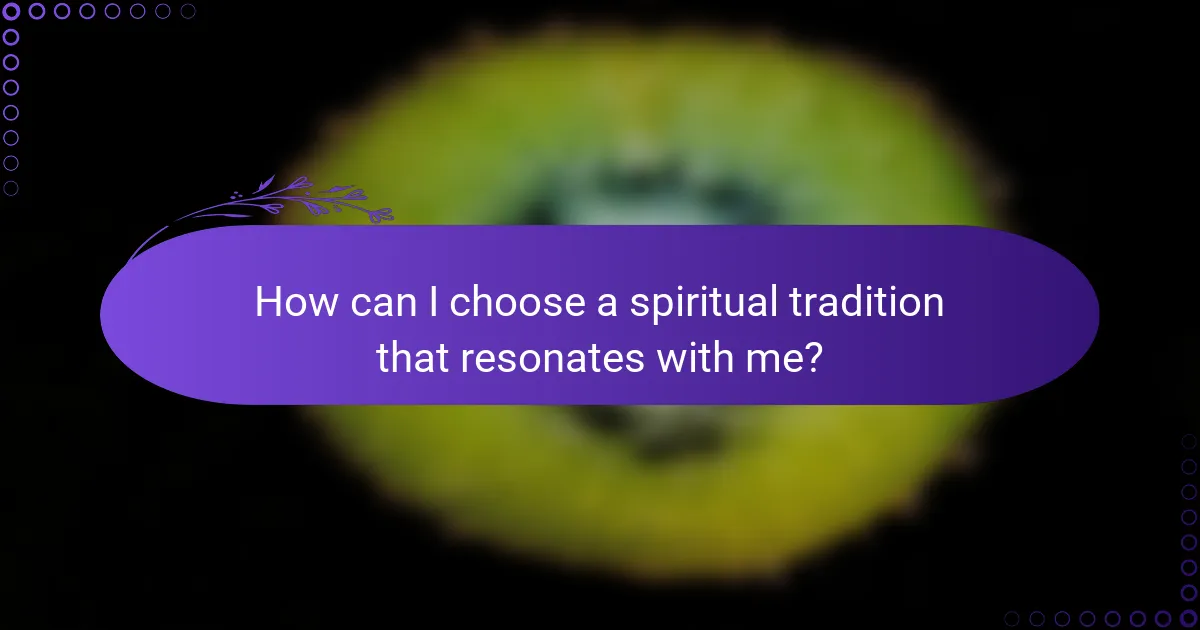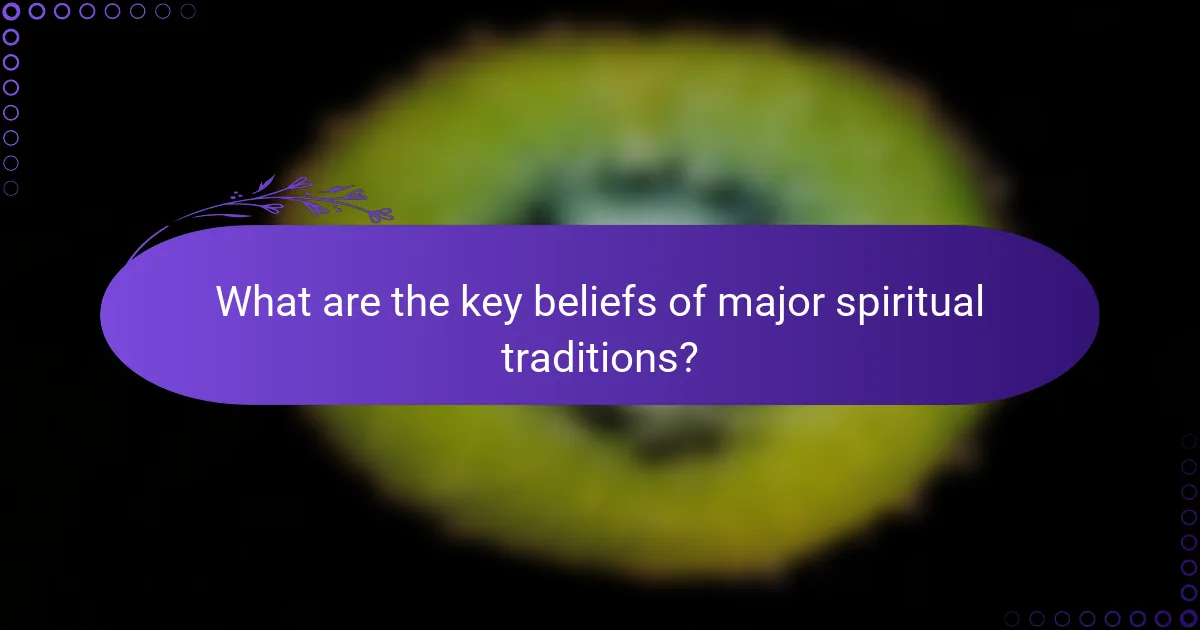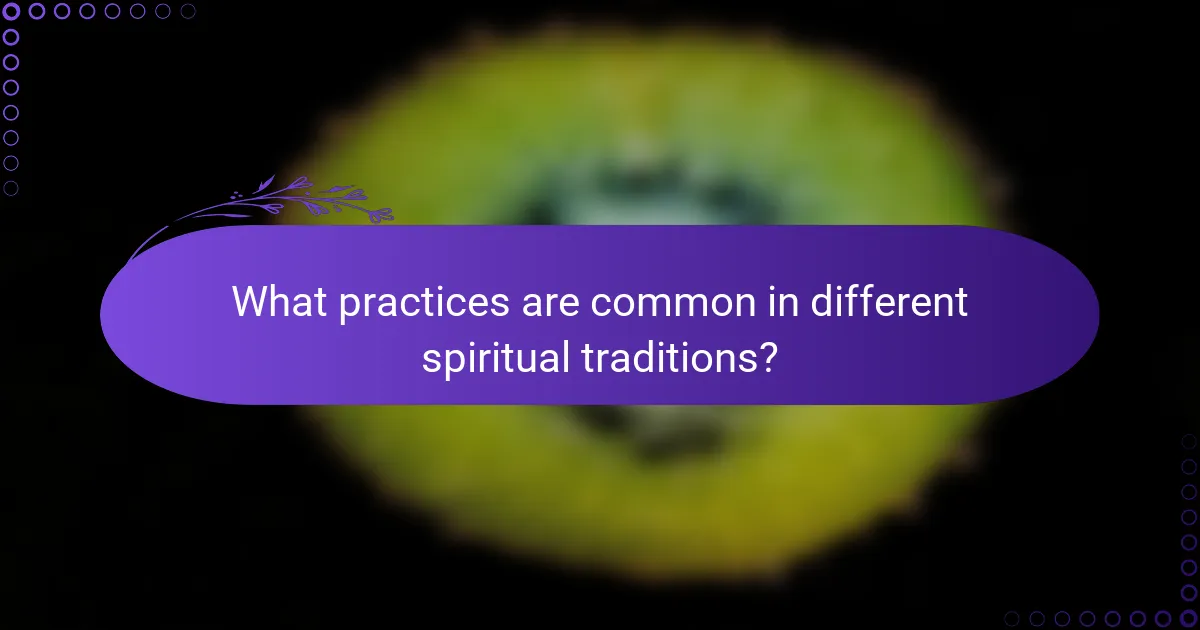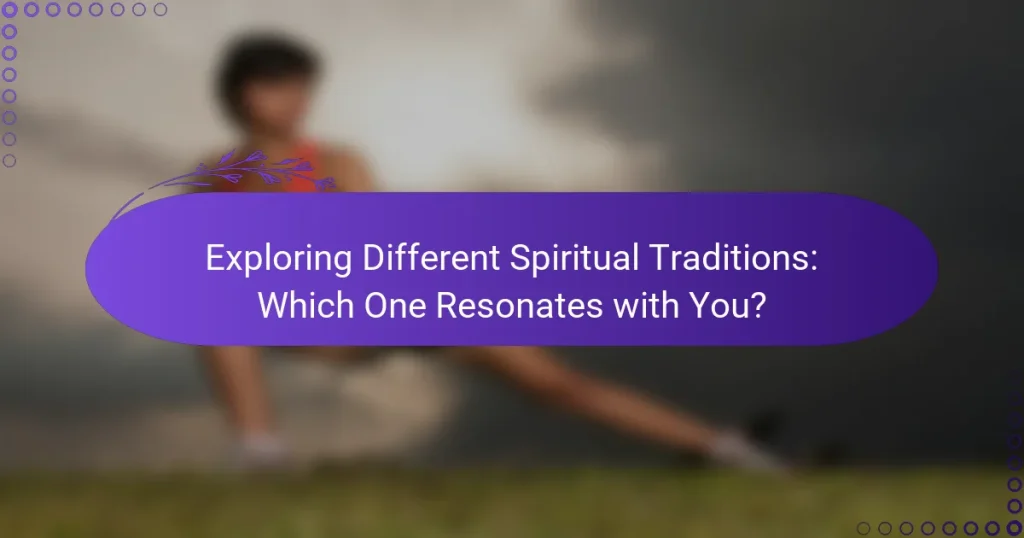In the diverse landscape of spiritual traditions in the United States, each offers unique beliefs and practices that can resonate differently with individuals. From Buddhism to New Age Spirituality, exploring these paths invites personal reflection on what aligns with your values and experiences. By delving into various traditions, you can discover which one speaks to your inner self and guides your understanding of existence and morality.

Which spiritual traditions are most popular in the United States?
In the United States, several spiritual traditions have gained significant followings, each offering unique beliefs and practices. Among the most popular are Buddhism, Christianity, Hinduism, Islam, and New Age Spirituality, each attracting diverse groups of practitioners.
Buddhism
Buddhism emphasizes the path to enlightenment through practices such as meditation, mindfulness, and ethical living. In the U.S., it has attracted many individuals seeking inner peace and a deeper understanding of the mind.
Common practices include meditation retreats and mindfulness workshops, often held in urban centers. Many Americans appreciate Buddhism’s non-dogmatic approach, allowing for personal interpretation and integration with other belief systems.
Christianity
Christianity remains the largest religion in the United States, encompassing various denominations such as Catholicism, Protestantism, and Orthodoxy. Each denomination offers distinct beliefs, rituals, and community practices.
Church services, Bible study groups, and community outreach programs are typical ways Christians engage with their faith. The emphasis on community and support networks often attracts individuals looking for belonging and moral guidance.
Hinduism
Hinduism is one of the oldest religions, characterized by a rich tapestry of beliefs, rituals, and philosophies. In the U.S., it has gained popularity through yoga, meditation, and festivals like Diwali.
Practices such as puja (worship) and participation in community events help individuals connect with their spirituality. Many Americans are drawn to Hinduism’s diversity and its emphasis on personal spiritual experience.
Islam
Islam is a monotheistic faith that emphasizes submission to the will of Allah. In the U.S., the Muslim community is diverse, with various cultural backgrounds contributing to a rich spiritual landscape.
Key practices include the five pillars of Islam, which guide daily life and community involvement. Mosques often serve as community centers, providing support and education for both Muslims and those interested in learning about the faith.
New Age Spirituality
New Age Spirituality is a broad movement that incorporates elements from various spiritual traditions, focusing on personal growth and holistic healing. It often emphasizes self-exploration, alternative healing practices, and the interconnectedness of all life.
Practices may include meditation, crystal healing, and energy work. Many individuals are drawn to New Age beliefs for their flexibility and the emphasis on individual experience and intuition.

How can I choose a spiritual tradition that resonates with me?
Choosing a spiritual tradition that resonates with you involves reflecting on your personal beliefs, values, and experiences. Consider what aspects of spirituality are most meaningful to you, and explore various traditions to find one that aligns with your inner self.
Identify personal values
Start by clarifying your core values and beliefs. Consider what principles guide your life, such as compassion, community, or personal growth. Write down these values to help you assess which spiritual traditions align with them.
For example, if you value community and connection, you might be drawn to traditions that emphasize group practices, such as Buddhism or certain forms of Christianity. If personal exploration is important, you may find resonance with New Age spirituality or individualistic practices like meditation.
Explore community offerings
Research local spiritual communities and organizations to see what they offer. Many cities have diverse spiritual groups, including churches, temples, and meditation centers. Attend open houses or informational sessions to learn more about their beliefs and practices.
Look for groups that host workshops, discussion circles, or volunteer opportunities. Engaging with these communities can provide insights into their values and help you determine if their approach resonates with you.
Attend local spiritual events
Participating in local spiritual events can deepen your understanding of different traditions. Check community calendars for events such as meditation sessions, prayer meetings, or festivals. These gatherings often provide a welcoming environment to explore various practices.
Consider attending a range of events to compare experiences. For instance, you might find a yoga class in a Hindu temple, a mindfulness workshop at a community center, or a sermon at a local church. Each experience can help clarify what feels right for you.

What are the key beliefs of major spiritual traditions?
Major spiritual traditions encompass a variety of beliefs that guide followers in their understanding of existence, morality, and the divine. Each tradition offers unique perspectives on life’s purpose, ethical conduct, and the nature of the universe.
Buddhism: Mindfulness and compassion
Buddhism emphasizes mindfulness and compassion as central tenets. Practitioners focus on being present in the moment and cultivating a deep sense of empathy towards all living beings. This approach aims to alleviate suffering and promote inner peace.
The Four Noble Truths outline the essence of Buddhist teachings, highlighting the nature of suffering and the path to enlightenment. Engaging in meditation and mindfulness practices can help individuals develop these qualities in their daily lives.
Christianity: Faith and salvation
Christianity centers on faith in Jesus Christ as the pathway to salvation. Believers are encouraged to develop a personal relationship with God, grounded in love, grace, and forgiveness. This faith is often expressed through prayer, worship, and community service.
The teachings of the Bible provide guidance on moral living and the importance of loving one’s neighbor. Engaging with a local church community can enhance spiritual growth and provide support in one’s faith journey.
Hinduism: Karma and dharma
Hinduism teaches the concepts of karma and dharma, which govern moral actions and responsibilities. Karma refers to the law of cause and effect, where one’s actions influence future circumstances. Dharma represents the ethical duties and responsibilities one must uphold in life.
Practicing yoga and meditation can help individuals align with their dharma and cultivate positive karma. Understanding one’s role in society and fulfilling it with integrity is essential for spiritual progress in Hinduism.
Islam: Submission to God
Islam is founded on the principle of submission to the will of Allah (God). Followers, known as Muslims, adhere to the Five Pillars of Islam, which include faith, prayer, charity, fasting, and pilgrimage. These practices foster a deep sense of community and devotion.
Engaging in daily prayers and acts of charity can strengthen one’s faith and connection to God. Understanding the teachings of the Quran and the Hadith is crucial for living a life aligned with Islamic principles.

What practices are common in different spiritual traditions?
Various spiritual traditions incorporate distinct practices that help individuals connect with the divine or their inner selves. Common practices include meditation, prayer, and rituals, each serving unique purposes and offering different pathways to spiritual growth.
Meditation in Buddhism
Meditation is a central practice in Buddhism, aimed at cultivating mindfulness and insight. Practitioners often engage in techniques such as focused breathing, visualization, or chanting to quiet the mind and develop awareness.
Common forms of meditation include Vipassana, which emphasizes observation of thoughts and sensations, and Zen meditation, which focuses on seated posture and breath. Beginners may start with short sessions, gradually increasing to 20-30 minutes as they become more comfortable.
Prayer in Christianity
Prayer is a fundamental practice in Christianity, serving as a means of communication with God. It can take various forms, including spontaneous prayers, structured prayers like the Lord’s Prayer, and intercessory prayers for others.
Many Christians pray daily, often in the morning or before meals, using prayer books or personal reflections. Engaging in prayer groups or church services can enhance the experience, providing community support and shared spiritual growth.
Puja in Hinduism
Puja is a ritualistic practice in Hinduism that involves offerings to deities, typically performed at home or in temples. It includes elements such as chanting mantras, lighting lamps, and presenting food or flowers to honor the divine.
The frequency of puja can vary, with many Hindus performing it daily or during special festivals. Understanding the specific rituals associated with different deities can deepen the experience, making it both a personal and communal act of devotion.


